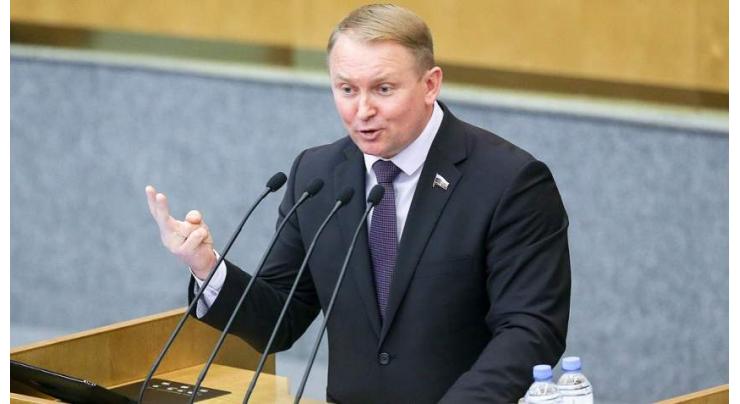
- Home
- World
- News
- Germany Should Prosecute Author of Article About Battle of Prokhorovka - Russian Lawmaker
Germany Should Prosecute Author Of Article About Battle Of Prokhorovka - Russian Lawmaker
Umer Jamshaid Published July 10, 2019 | 07:18 PM

Germany should open a criminal case against Die Welt editor Sven Felix Kellerhof, who wrote an article about the 1943 Battle of Prokhorovka that calls the event a defeat of the Red Army and says the monument at the site should be demolished, Alexander Sherin, the first deputy chairman of the Russian parliament's lower house defense committee, told Sputnik on Wednesday
"This is a dangerous path for the German public: refusal to open a criminal case against this journalist will be a silent consent of the German leadership and journalist community with the position of this villain ... He made ... German people's penitence for the crimes of the Nazi Germany null and void," Sherin said.
He called Kellerhof's Tuesday article an act of glorification of Nazism and warned about possible dangerous consequences of the German public silent position on the issue.
Kellerhof called the Battle of Prokhorovka a huge defeat of the Red Army and said that the monument should be demolished because the great victory of the Soviet troops at the site was just a myth.
The Die Welt editor cited an opinion of German military historian Karl-Heinz Frieser and pointed out that the materials of German photographical reconnaissance, which were recently found in the US National Archives at College Park, Maryland, by UK historian Ben Wheatley, proved the theory about the great defeat of the Red Army near Prokhorovka.
According to Kellerhof, on July 12, 1943, 186 German tanks engaged in a battle with 672 Soviet vehicles, which ended with loss of 235 USSR tanks and only five German ones.
Kellerhof believes that the Soviet tanks attacked the German troops from the dominating height 252.2 but faced a tank ditch, prepared by the Germans. A dense group of Soviet vehicles was a comfortable target for German tanks that opened heavy fire that destroyed many USSR tanks, the editor wrote.
Kellerhof said that a group of four German heavy tanks Panzerkampfwagen VI Tiger I had destroyed up to 55 Soviet tanks. The battlefield looked like a cemetery of Soviet tanks, according to Kellerhof, who cited the recently found photos.
The Battle of Prokhorovka is one of the episodes of the wider Battle for Kursk, which was the last attempt of Nazi Germany to change the course of the fatal war against the Soviet Union.
Some Soviet historians believed that the Battle of Prokhorovka was one of the biggest tank battles in world military history. The battle is often viewed as a victory of the Soviet troops.
The German 2nd SS-Panzer Corps included three infamous SS divisions: 1st SS-Panzergrenadier Division Leibstandarte SS Adolf Hitler, 2nd SS-Panzergrenadier Division Das Reich and 3rd SS-Panzergrenadier Division Totenkopf, while the Soviet troops included units of the 5th Guard tank army.
The Soviet interpretation of the event said that the German troops had some 800 tanks while the Red Army some 850 vehicles. The German side is said to have lost some 400 tanks.
The scale and role of the Battle of Prokhorovka was a subject for heated debates in recent decades and Kellerhof is not the first one who tries to view the event as a defeat of the Soviet army.
Either way, defensive operations of the Red Army in July 1943 resulted in the failure of the German Operation Citadel, aimed at defeating the Soviet troops at the Kursk salient. The successful defensive activities allowed the Red Army to launch a counteroffensive and defeat the German troops near Kursk.
Following the Battle for Kursk, Nazi Germany was not able to carry out massive offensive operations at the Eastern Front anymore. Almost all further battles ended with defeats for German troops, including the Battle for Berlin in late April-early May 1945, which put an end to the 4-year long Great Patriotic War.
Related Topics
Recent Stories

Govt committed to developing gems, jewellery sector: Minister

Three new bills introduced in Senate

Nine dead, 1,318 injured in Punjab road accidents

Ukraine, Russia exchange fire, at least seven dead

1st-ever National Sports Revival conference starts next month

Joint venture decided for action against MEPCO’s defaulters

Modern irrigation system imperative to deal with water scarcity: UAF VC

Bringing 4.4mln hectares suitable land under olive cultivation to address econom ..

One woman died after speedy bus overturned

155 killed in Tanzania as heavy rains lash East Africa

Parliament committed to resolve public issues on priority basis: Ghulam Mustafa

Collaborative Care of Diabetes Centre inaugurated in Faisalabad
More Stories From World
-

Ukraine, Russia exchange fire, at least seven dead
23 minutes ago -

155 killed in Tanzania as heavy rains lash East Africa
29 minutes ago -

US economic growth slows significantly in first quarter
22 minutes ago -

Macron warns 'mortal' Europe needs stronger defence
27 minutes ago -

COP29 host says deal on climate aid essential but offers few details
55 minutes ago -
Ukraine jails couple for helping Russia strike hospital
1 hour ago
-
Togo opposition asks W.Africa court to overturn reforms
1 hour ago -
Paris landmark Moulin Rouge's windmill sails collapse
2 hours ago -
Ahead of feared Rafah invasion, Palestinians mourn bombardment dead
2 hours ago -
155 killed in Tanzania as heavy rains cause floods, landslides: PM
2 hours ago -
Car giants vie for EV crown at Beijing's Auto China show
2 hours ago -
Chinese defense minister to attend SCO meeting in Kazakhstan
2 hours ago




